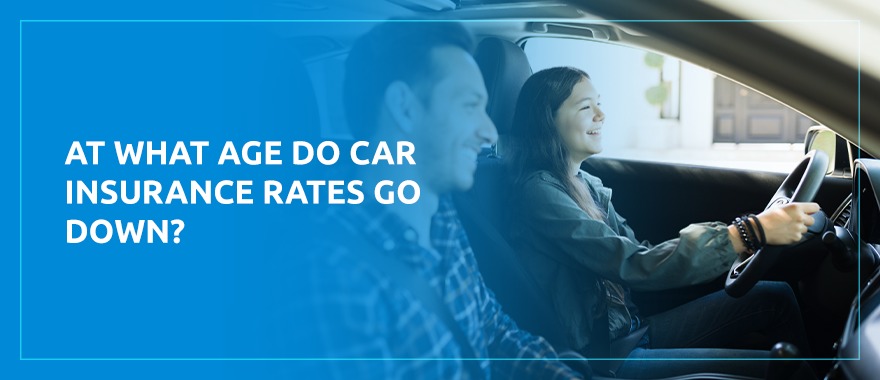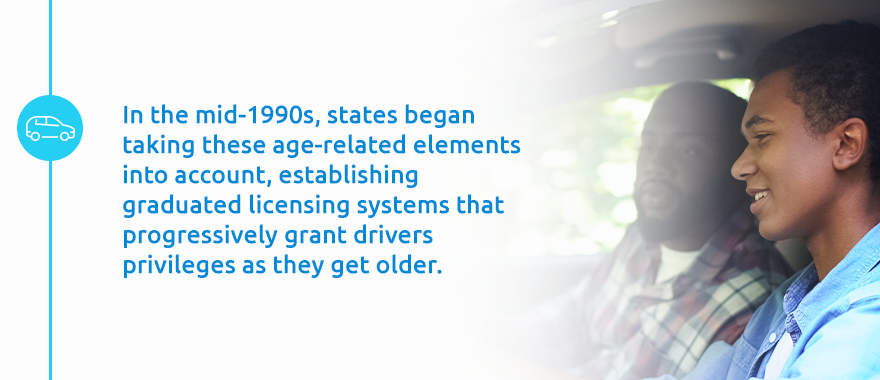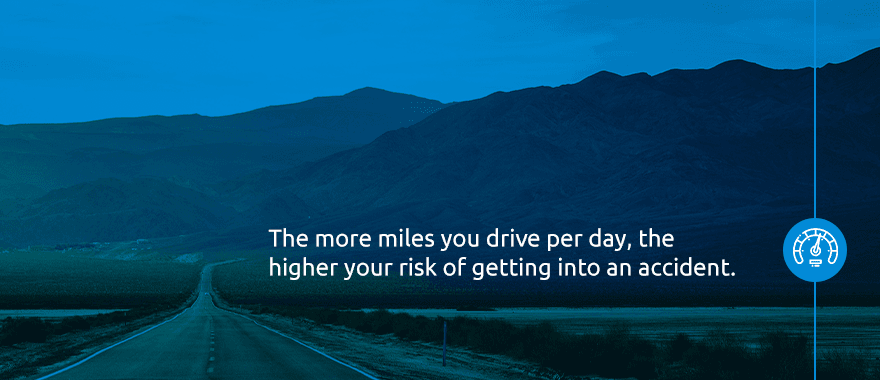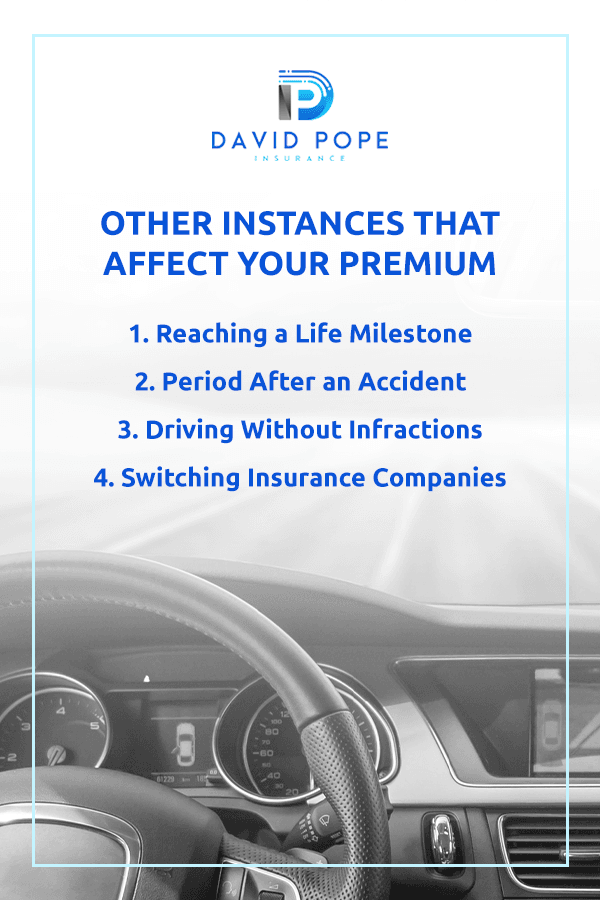
Many factors play into car insurance rates. Though many assume rates are based solely on a person’s driving record, there’s much more that goes into establishing auto insurance rates beyond being a good driver. Everything from age to car type to marital status can impact how much you pay for your insurance — but this doesn’t mean your rates are set in stone.
There are several ways you can bring your insurance rates down, even if you’re a new driver.
Age plays a considerable role in your auto insurance rate, especially if you’re a teenager. In fact, younger drivers may pay double or higher the average insurance rate. Why? Because teenage drivers are at a disproportionately higher risk of car crashes and fatal accidents compared to older drivers.
In the United States, the fatal crash-per-mile for licensed drivers aged 16-19 is nearly three times the rate of individuals aged 20 and older. Motor vehicle crashes are also the second leading cause of death for teens in the U.S.
According to the Centers for Disease Control and Prevention (CDC), younger drivers are at a higher risk for car accidents due to numerous factors:
In the mid-1990s, states began taking these age-related elements into account, establishing graduated licensing systems that progressively grant drivers privileges as they get older. These systems also introduced restrictions for younger drivers — including nighttime driving constraints and higher licensing ages — resulting in reduced crash-related fatalities.

Though age has a considerable impact on your car insurance premium, there are many additional components that contribute to your rates. Many of these factors are permanent, but others are subject to change depending on your lifestyle decisions.
The insurance coverage you choose may affect the cost of your premium, including elements like basic car insurance limitations, deductible amount and policy options. Most policies include collision coverage, personal injury protection or medical payments, liability coverage, uninsured motorist coverage, and comprehensive coverage, depending on the state. You may even consider optional protections, such as rental reimbursement, sound system coverage, and towing and labor costs.
All of these coverage options, though beneficial, can add up.
Most drivers realize their driving record plays a significant part in their insurance rates — whether for better or worse. If you have a clean driving record, you may end up with a good driver discount ranging from 10% to 40%, depending on your insurance company. Most providers require drivers to be incident-free for a specific period before they can qualify for a discount.
If you’ve made numerous insurance claims, you’re likely to have a higher premium, even if the accidents weren’t your fault. Drivers who have caused a wreck pay an average of 50% more for their insurance than those who haven’t. How many accidents you’ve had and how many years you’ve been driving also impact your driving record and insurance rates.
Many insurance companies charge more for your auto insurance if you have a poor credit score or no credit history. On the other hand, a good credit score could potentially save you money.
The only states that do not take drivers’ credit scores into account when determining insurance rates are California, Massachusetts and Hawaii.
Surprisingly, your ZIP code can influence your car insurance rate. Some locations have higher crime and accident rates than others, such as big cities, places with crowded roads and other urban areas. If you work or park in any of these areas regularly, you may get a slight upcharge on your premium.
Drivers who frequent more rural areas may receive discounts on their car insurance. These locations typically have less-congested roads and lower property crime rates.
In most states, it’s legal to discriminate by gender when it comes to car insurance. According to the United States Department of Transportation, the number of male crash deaths was over twice as high as that of females between 1975 and 2019. Because men are statistically more likely to exhibit dangerous driving behavior than women, they tend to pay more for their insurance premiums.
Male drivers under the age of 25 typically pay the most for their car insurance, but this gender gap usually closes when drivers hit their 30s.
Your marital status may affect whether your insurance rates go up or down. Married drivers pay an average of $160 less per year than single, unmarried drivers. Though being married doesn’t necessarily make you a better driver, it does tend to result in fewer accidents. Why? Because married couples typically share driving responsibilities, meaning each individual files fewer claims than the average driver and presents a lower risk to insurance providers.
Insurance premiums for single and married drivers vary by insurance company. Some providers charge considerably more for single drivers versus married drivers, while others may not consider marital status at all.
The more miles you drive per day, the higher your risk of getting into an accident. That’s why how much you drive your car may impact your insurance premium. For example, a driver who travels long distances for business trips will likely pay more for their insurance than someone who only uses their vehicle to run weekend errands.
If you have a long daily commute to and from work, your insurance company may charge you more as a precaution.

Though young adults have higher insurance rates than other drivers, that doesn’t mean you’ll have to make higher payments forever. With every year of driving experience, your rates will gradually decline. By the time you reach age 25, your costs will be much lower than your previous premium. Though 25-year-old drivers have statistically better rates, how much your insurance decreases by this age varies.
All insurers have different car insurance rates for 25-year-olds. Some companies will only reduce your rates slightly when you turn 25, while others offer much cheaper rates for this age bracket. You can also find insurance providers that offer discounts for 25-year-olds, such as telematics programs, good driver discounts, low mileage savings, bundling opportunities and more.
Other factors that influence your insurance rates at age 25 include:
Though your car insurance rates may go down when you turn 25, your premium will increase again after age 65.
Turning 25 isn’t the only time you could potentially see your car insurance rates go down. There are other instances and events that may positively affect your premium, resulting in lower rates.
Throughout your life, you may reach milestones that cause your auto insurance rates to decrease. Though these occasions have nothing to do with your car inherently, they can still result in reduced costs.
If you experience any of the following lifestyle changes, you’ll likely achieve a lower insurance premium:
Getting into an accident is never great for your driving record or insurance premium, but there is a light at the end of the tunnel. In most cases, car accidents only affect your insurance rates for three to five years unless they involve serious incidents, such as alcohol-related violations and fatalities or serious injuries. That’s because many states limit how many years insurance companies can consider at-fault accidents when calculating a driver’s premium.
If you go six years without getting a ticket or being involved in another car accident, your premium will likely go back down.
Many insurance companies reward drivers who are incident-free for a specific period of time. These rewards are called good driver discounts. There are three primary types of good driver discounts you may earn:
All insurance providers offer different insurance premiums. That’s because each insurer uses a different formula to set their insurance rates, and these equations change frequently. That means the insurance company that offered the lowest rate a few years ago may not be the best option for you now.
If you experience any of the milestones mentioned, such as getting married or buying a house, there’s a high possibility you can find a better rate. Whatever the case, shopping around for a different insurance provider may benefit you significantly.

If you’re a new driver, you don’t have to wait to get a lower insurance premium. There are ways you can instigate a better rate yourself by learning how to lower your car insurance premium:
Learning safe driving techniques through a driving safety course lowers your risk of being involved in an accident, which is why many insurance companies offer discounts for teens who have completed a driver’s education program. Though all insurers have different rates involving driving classes, the average savings is about 10%.
In most cases, defensive driving, DUI awareness and advanced driving courses are considered most valuable to insurance providers, while specialized classes like commercial driving courses may not affect your premium.
You may be able to get an auto insurance discount based on your academic achievements. Many insurers will lower rates for young drivers who maintain at least a B average in high school or college. If you’re in college, make sure you’re taking the proper number of credits to be eligible for academic-related insurance deductions.
The type of car you drive can impact your insurance premium — the safer your vehicle is, the better your rates will be. You can determine your car’s safety rating by entering the year, make and model on the National Highway Traffic Safety Administration (NHTSA) website. This site measures your car’s safety score based on frontal crash, side barrier crash, side pole crash and rollover resistance tests.
Make sure whatever car you’re assigned to on your insurance policy is the only car you drive. If you get into an accident driving an unassigned car, you may undergo penalties on your premium.
Paying the minimum on your deductibles may seem like a wise choice financially, but higher deductibles actually save you more in the long run. When you raise your comprehensive and collision deductibles to $1,000 or more, your premium will go down. These deductibles can prevent you from filing small claims and compromising your claims-free discount.
Some insurers offer better teen driver rates than others. You can secure the best insurance deal by comparing rates, coverage and services from different insurance companies. Weighing your options can be as easy as browsing the internet or making a few phone calls. Some websites even feature tools that calculate custom auto insurance quotes instantly.
If you’re looking for a reliable insurance company to secure a low car insurance rate, David Pope Insurance Services, LLC is your solution. Our insurance agents have a wealth of industry knowledge and experience that they use to find you the right policy, whether you’re a teen driver or a new driver. We offer high-quality insurance at the lowest costs to give you the peace of mind you deserve.
Request a free custom car insurance quote and work with one of our agents today!